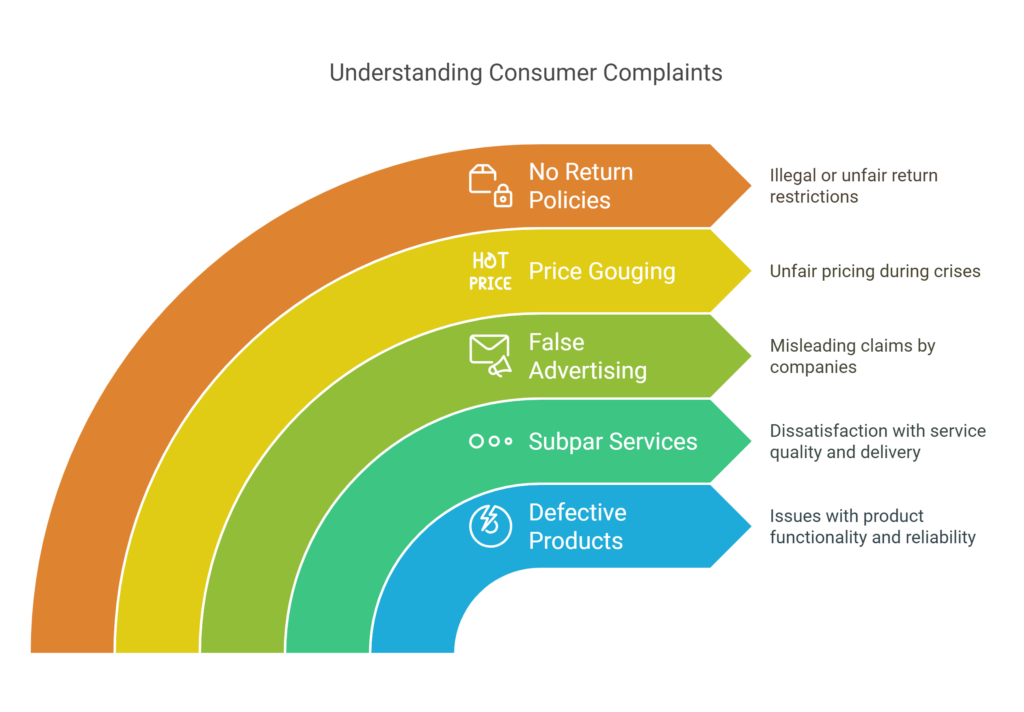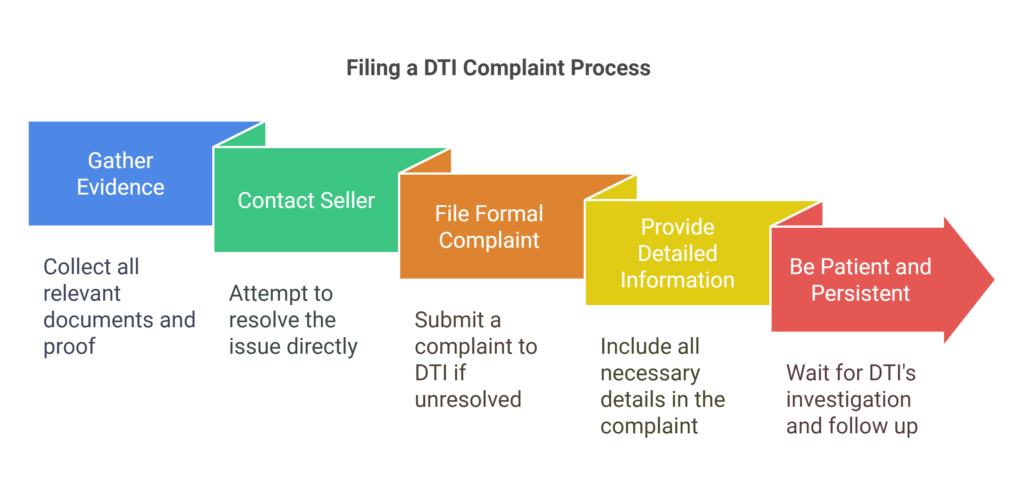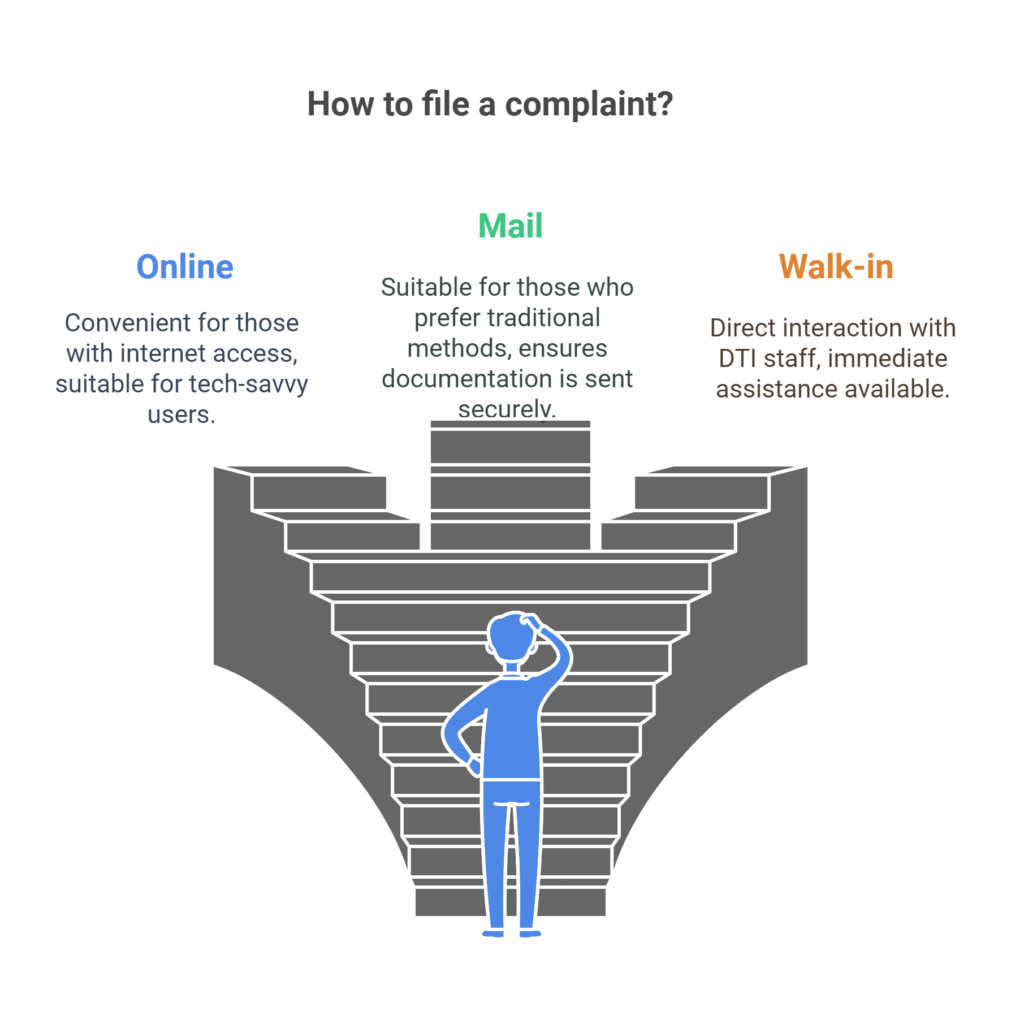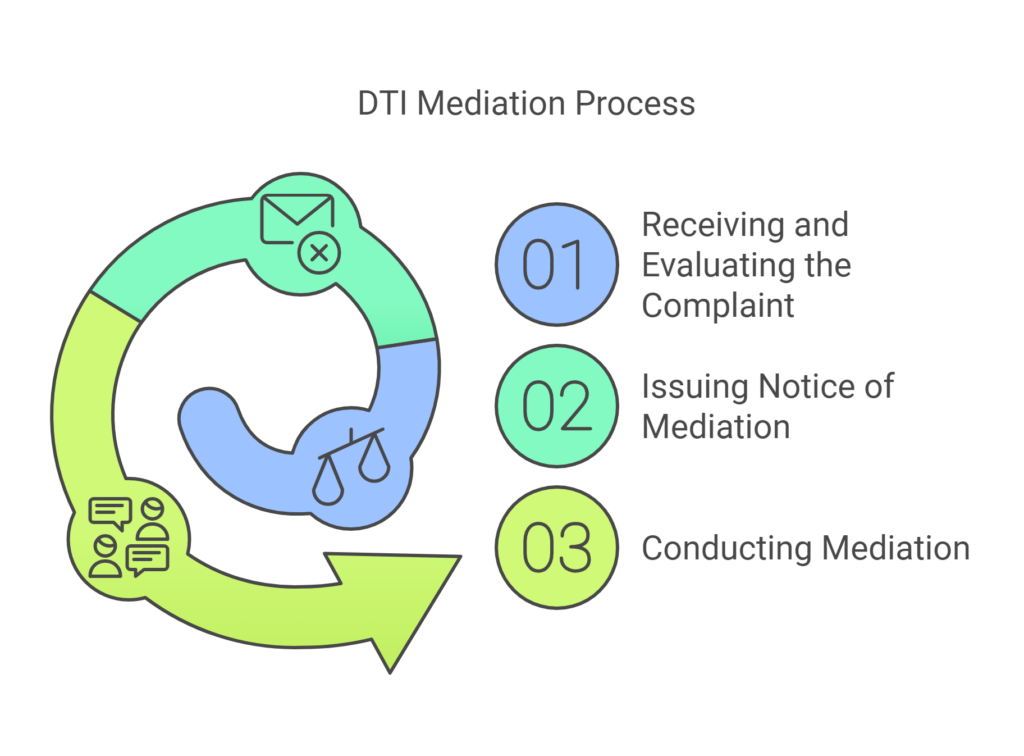Last updated on April 26th, 2025 at 06:00 am
Let’s face it, we’ve all been there. You buy a product or service, and it’s a total dud. Maybe it’s broken, doesn’t work as advertised, or the service was downright terrible.
You feel ripped off, frustrated, and powerless.
But hold on!
You don’t have to take it lying down. The Department of Trade and Industry (DTI) is your secret weapon in the fight against shady businesses and consumer rights violations.
Think of the DTI as your personal consumer advocate, ready to step in and help you get justice (and maybe even some compensation!).
This article is your ultimate guide to understanding DTI complaints, what you can complain about, and how to file a complaint effectively.
What Can You Complain About?
The DTI handles a wide range of consumer complaints. Here are some of the most common issues they tackle:

- Defective Products: This is a big one. Did your new phone die after a week? Is your washing machine doing the tango instead of washing your clothes? The DTI can help you get a refund, replacement, or repair.
- Subpar Services: Did that contractor botch your renovation? Was the internet service you paid for slower than a snail in molasses? You can file a DTI complaint for unsatisfactory services.
- False Advertising: If a company makes misleading claims about its products or services, the DTI can hold them accountable. Think “miracle” weight loss pills that don’t work or “unlimited” data plans with hidden caps.
- Price Gouging: Are stores jacking up prices on essential goods during a crisis? Report it to the DTI! They have the power to crack down on unfair pricing practices.
- No Return, No Exchange Policies: Many stores have a “no return, no exchange” policy, but this is often illegal. The DTI can help you get your money back if you have a legitimate reason to return a product.
Remember, these are just a few examples. The DTI’s mandate is to protect consumers, so if you feel you’ve been wronged in a marketplace transaction, it’s worth checking if they can help.
How to File a DTI Complaint
Filing a DTI complaint might seem intimidating, but it’s actually a straightforward process. Just follow these steps:

- Gather Your Evidence: This is crucial! You need proof to back up your claim. Keep all receipts, contracts, warranties, photos, and any other documentation related to the transaction.
- Contact the Seller: Before going to the DTI, try to resolve the issue directly with the seller. Sometimes, a simple conversation can lead to a quick resolution.
- File a Formal Complaint: If talking to the seller doesn’t work, it’s time to bring in the big guns. You can file a complaint online, through mail, or in person at the nearest DTI office.
- Provide Detailed Information: Be clear and concise when describing your complaint. Include all relevant details, such as the date of purchase, the product or service involved, the amount you paid, and the problem you encountered.
- Be Patient and Persistent: The DTI will investigate your complaint and try to mediate a resolution between you and the seller. This process takes time, so be patient and follow up regularly.
How To File Formal DTI Complaint
Filing a complaint with the Department of Trade and Industry (DTI) in the Philippines involves several steps and options to ensure that consumer grievances are addressed effectively. Here’s a comprehensive guide on how to file a complaint:

Modes of Filing a Complaint
You can file a complaint through the following methods:
Method 1: Online
Visit the Philippine Online Dispute Resolution System (PODRS) at www.podrs.dti.gov.ph to submit your complaint electronically. This platform allows consumers to report issues related to defective products, deceptive sales practices, and more.
Method 2: Mail
Complaints can be sent via courier or registered mail. Ensure that you include all necessary documentation with your complaint.
Method 3: Walk-in
You can file your complaint in person at any DTI office during regular business hours (Monday to Friday, 8:00 AM – 5:00 PM). For those in the National Capital Region, visit the DTI-FTEB at UPRC Building, 315 Sen. Gil J. Puyat Ave., Makati City.
Requirements for Filing
When filing a complaint, you need to prepare the following:
- Accomplished Initial Complaint Form: This form can typically be found on the DTI website or obtained at their offices.
- Proof of Transaction: Include any relevant documents such as official receipts, delivery receipts, invoices, or job orders.
- Supporting Evidence: Any additional evidence that supports your claim should be attached.
Mediation Process
Upon receiving your complaint, DTI will initiate a mediation process, which is mandatory for all consumer complaints under the Consumer Act. The steps include:

- Receiving and Evaluating the Complaint: DTI will assess whether your complaint falls under their jurisdiction.
- Issuing Notice of Mediation: If applicable, a notice will be issued to both parties.
- Conducting Mediation: A designated Mediation Officer will facilitate discussions between you and the business involved to reach an amicable resolution.
If mediation fails, a Certificate to File Action (CFA) will be issued, allowing you to escalate the matter formally within DTI or to relevant courts.
Additional Information
For complaints against online sellers or businesses without clear contact information, it is advised to report directly to law enforcement agencies like the Philippine National Police (PNP) or the National Bureau of Investigation (NBI).
This structured approach ensures that consumer complaints are handled efficiently and fairly by the DTI.
Pro Tip: Keep records of all your communication with the seller and the DTI. This will help you stay organized and ensure your complaint is handled efficiently.
Read also: DTI Registration Fees in the Philippines
Maximizing Your Chances of Success
Want to increase your odds of winning your DTI complaint? Here are some insider tips:
- Act Quickly: Don’t wait too long to file your complaint. The sooner you act, the better your chances of getting a favorable outcome.
- Be Professional: Maintain a respectful and professional demeanor throughout the process. Avoid getting emotional or aggressive, as this could hurt your case.
- Know Your Rights: Familiarize yourself with the Consumer Act of the Philippines and other relevant laws. This will help you understand your rights and make a stronger case.
- Use Online Resources: The DTI website has a wealth of information on consumer rights and complaint procedures. Take advantage of these resources to educate yourself and prepare your case.
Remember, the DTI is there to help you. Don’t be afraid to ask questions or seek clarification if you need it.
Read also: How Many Days to Get a DTI Permit?
Besides DTI Complaints, Here Are Other Avenues for Consumer Protection
While the DTI is a powerful ally, it’s not your only option. Here are some other avenues you can explore:
- Consumer Organizations: Several non-profit organizations advocate for consumer rights and provide assistance with complaints.
- Social Media: In today’s digital age, social media can be a powerful tool for holding businesses accountable. Sharing your negative experience online can often get a company’s attention.
- Legal Action: In some cases, you may need to take legal action to get justice. Consult with a lawyer to explore your options.
The key takeaway? You have the power to fight back against unfair business practices. Don’t be a passive consumer. Know your rights, use the resources available to you, and stand up for yourself!
The Future of Consumer Protection: Online Dispute Resolution
The DTI is constantly evolving to meet the needs of consumers in the digital age.
One of their latest initiatives is the Philippine Online Dispute Resolution System (PODRS).
PODRS is an online platform that allows consumers to file complaints and resolve disputes with businesses electronically. This makes the process faster, more convenient, and accessible to everyone.
Here are some of the benefits of PODRS:
- Convenience: You can file a complaint from anywhere, anytime, using your computer or smartphone.
- Speed: The online process is generally faster than traditional methods.
- Transparency: You can track the status of your complaint online.
- Accessibility: PODRS is available to all consumers, regardless of their location.
Your Role in a Fair Marketplace
Remember, consumer protection is a two-way street. While the DTI and other organizations are there to support you, you also have a role to play in creating a fair and ethical marketplace.
Here are some things you can do:
- Be an informed consumer: Do your research before making a purchase. Read reviews, compare prices, and understand the terms and conditions.
- Support ethical businesses: Choose to do business with companies that have a good reputation and treat their customers fairly.
- Speak up: If you experience a problem, don’t be afraid to speak up and file a complaint. Your actions can help protect other consumers and hold businesses accountable.
The bottom line?
Don’t let yourself be taken advantage of.
Know your rights, be an active consumer, and use the tools available to you to fight for a fair marketplace.
The DTI is your ally in this fight, so don’t hesitate to seek help when needed.
Read also:
 Web HostingCost-effective shared hosting solutions
Web HostingCost-effective shared hosting solutions Reseller HostingStart your own hosting business without tech hustle
Reseller HostingStart your own hosting business without tech hustle Affiliate ProgramEarn commission by referring customers to our platforms
Affiliate ProgramEarn commission by referring customers to our platforms cPanel HostingHosting powered by cPanel (Mostly user friendly)
cPanel HostingHosting powered by cPanel (Mostly user friendly) Windows HostingOptimized for windows based-applications and sites
Windows HostingOptimized for windows based-applications and sites Domain SearchFind and register available domain names in seconds
Domain SearchFind and register available domain names in seconds All DomainsExplore and register domain extensions across the world
All DomainsExplore and register domain extensions across the world Domain Transfermove your domain to us with zero downtime and full control
Domain Transfermove your domain to us with zero downtime and full control Whois LookupLook up domain ownership, expiry dates and registrar information
Whois LookupLook up domain ownership, expiry dates and registrar information .com DomainSecure the most recognized domain for global credibility
.com DomainSecure the most recognized domain for global credibility VPS HostingScalable virtual servers. Full root access. Faster speed.
VPS HostingScalable virtual servers. Full root access. Faster speed. Managed VPSNot a tech expert? Choose our fully managed VPS server.
Managed VPSNot a tech expert? Choose our fully managed VPS server. Dedicated ServersGet the full power and complete control of your own physical server.
Dedicated ServersGet the full power and complete control of your own physical server.
